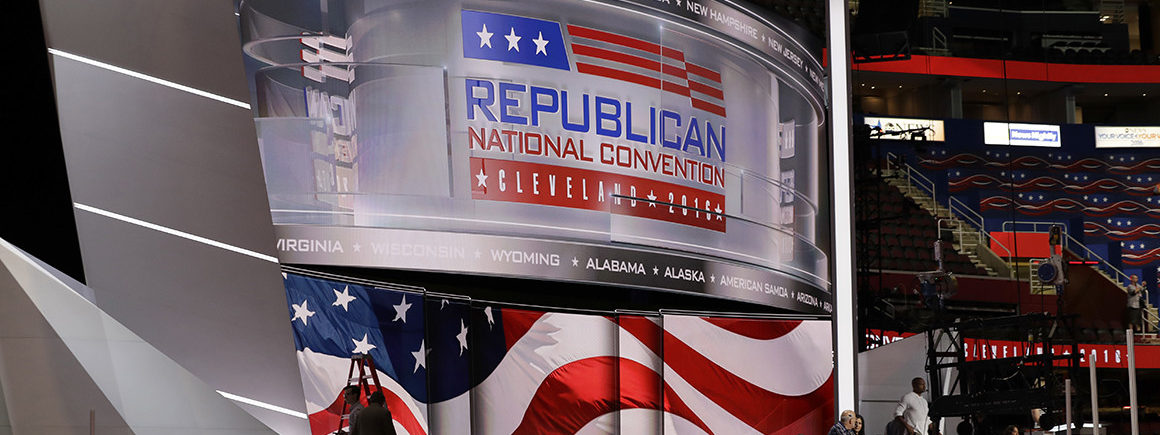Image from Politico
“Expect the unexpected.”
That’s how a senior Republican in Congress summed up her answer to the question, “What is going to happen in Cleveland?”
Every four years, party conventions are the culminating event of the long primary season. Conventions are a time to stress unity among former competitors, framing the “us vs. them” message, passing the mantel of party leadership into the hands of the nominee, and projecting that nominee officially into the general election. While that may be the status quo approach for the Democrats convening in Philadelphia, don’t expect the same to unfold at the Republican National Convention in Cleveland.
Much of what happens between Monday, July 18 at 1:00 p.m. when the GOP convention starts and Thursday night when it concludes is still somewhat of a mystery.
Here’s a look at how the Republican convention might unfold and how that might shape the political landscape for the general election:
The Good
When all of the current national polling data shows more than 60 percent of Americans believing that the country is headed on the “wrong track”, a candidate that can portray themselves as “different” is a good thing.
Donald Trump is definitely different.
As the head of a major PR firm said privately, “The Republican convention will be like nothing you have ever seen. For the first time ever, a non-politician – a political phenomenon – will be receiving the nomination to be President of the United States.”
Conventions are a pinnacle of political theater; formats for educating voters in an entertaining way. Trump is widely viewed as being a master of capturing people’s attention and is expected to “put on a show” at the convention. Anticipation (and angst) is building about how the Trump operation will fill those precious few hours of nightly television. But the looming question about the outcome of the convention has become, will Trump’s unconventional style and flair for the dramatic serve to set his candidacy on a course for victory in November?
Lest not the voters be ignored, one long-time GOP campaign consultant pointed out that the millions of voters who cast their ballots for Trump during the primaries will have a sense of vindication and triumph that a true outsider has taken the reins of the party. The believers in Trump – many of whom are new to the political process – will have a level of enthusiasm for the Republican nominee that is unmatched by any recent presidential candidate. Further buttressing a growing level of excitement about the GOP candidate is a spate of national and state-wide polls the week before the convention showing Trump either leading in several important swing states or running dead-even with Clinton nationally.
The Bad
Many of the 2016 GOP candidates are skipping Cleveland altogether. Neither the former Bush presidents nor Mitt Romney, the 2012 Republican nominee, will be attending. That makes the goal of creating party unity and passing the standard bearer torch to Trump difficult. The convention agenda is only coming into shape with just a few days to go, do not expect a large number of high profile Republican elected officials to be taking the stage to promote Trump’s candidacy. In fact, as one GOP Congressman said privately, “If they ask me to speak, I will probably say that ‘I’ll be washing my hair.” But a major Republican media operative argued that he doesn’t expect Trump to even try for much of a unity message at the convention, nor even want the torch to be “passed”. “Everything about this year is different. He isn’t waiting for the elders to anoint him as the leader of the Republican Party. He has already grabbed it by the proverbial throat and made it his.”
Another turn for the worse at Cleveland is the stunning lack of corporate support. Conventions are nothing if not one big series of parties, often underwritten by companies and associations wanting to wine and dine delegates and their Congressional representatives. The owner of a prominent GOP fund raising and event planning company said privately, “Almost all of the events are operating in the red and absent some major last-minute money; plenty of people will be coming out of Cleveland with some pretty big debts.” This lack of financial support is largely a result of the unwillingness of companies and groups to have their brands associated with Trump.
The Ugly
Outside “The Q”, as the convention center is affectionately known locally, will be ground zero for protests. The highly visible tragedies of the past few weeks (Dallas, Baton Rouge, Orlando…) may well be only a precursor to massive protest, conflict, and violence next week in Cleveland. Many senior GOP officials have said they expect “riots in the streets” and for protestors to be bussed into the city for the sole purpose of disrupting the proceedings and thereby diverting the focus of media coverage away from Trump. As one senior US Senator said, “This might make Chicago (1968) pale in comparison.”
Concerns about security are at a fever pitch. According to local news reports, more than 3,000 police officers from outside Cleveland will be brought in to supplement city’s regular force of about 1,700 officers.
Once inside the convention center, more conflict is possible, as it seems clear that several hundred of the duly chosen delegates have indicated their desire to deny Trump the nomination. While convention rules will be decided before the convention begins, those rules will still have to be ratified by the delegates. Whether an attempt to deny Trump the nomination (and what that looks like) will be something to keep an eye on through the weekend and into Monday.
Look for Cleveland to be different from any convention you have ever seen. And for Trump, different is good.

